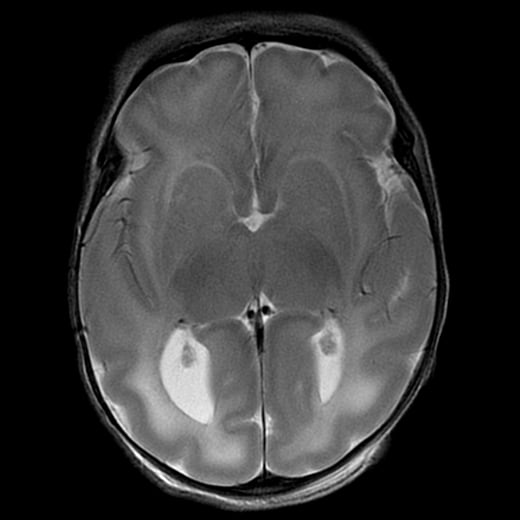Patient was a young adult working in finance at a major tech company found to be mute and diaphoretic.
Physical exam notable for fever, tachycardiac, hypertension, awake but not following commands, aphasic, and with hyperreflexia and muscle ridigity. CK peaked to 11,344.
MRI shows multiple ovoid to splotchy confluent lesions in the white matter with diffusion restriction. Lesions also enhanced with hyperperfusion (not shown).
Urine drug test positive for cocaine. Infectious work-up was negative. Steroids were started with good recovery.
Patient denied knowingly taking cocaine but did say weekly use of what they thought was MDMA with friends…
Final diagnosis: Levamisole-induced leukoencephalopathy. Levamisole is an antiparasite medication that is no longer used in the US but still in some other countries. It is a common cutting agent in cocaine. It’s neurotoxic effects primarily come from causing demyelination.


Thank you for this comment, because it brings up some very important issues, which I hope this reply addresses.
The biggest issue is the matter of patient confidentiality. This is of utmost concern in an online medical community, especially one wherein clinical vignettes are presented. I take extreme care to avoid including any information that can narrow down to a patient, thus breaching confidentiality. Similarly, I expect anyone else commenting or posting here to follow this rule, Rule 4, which was created not just for internet etiquette but literally to prevent illegal breaches of confidentiality. With regards to consent - this is not required for publishing de-identified information, or sites like Radiopaedia with their thousands of cases would not exist. With regards to patient confidential information that cannot be shared - this not only includes the obvious ones such as patient age, DOB, dates of events, addresses, etc etc, but also vaguer information. For example, there are cases that I would never present here online because the disease is so incredibly rare that the disease itself becomes a patient identifier. These types of cases I would formally publish in the literature if need be. For this particular case, I do not think the information presented breaks these rules (or I would not have posted). Cocaine use is fairly common among the demographic in question, and being found in the shower is not that uncommon, although dramatic.
Second, to address the following:
This is something that I have been struggling with. This community is growing at an exceptional rate, and visitors seem to be overwhelmingly from a non-medical background. There are comments that frankly say they do not understand certain things, and other comments and questions imply a lack of experience with looking at imaging studies. I have been vacillating between using terminology and sentences that laypeople can understand versus maintaining medical terminology. I think this is why you think I am writing about a friend in the title, but the body of the post is more medically-oriented. For this reason, I have changed the title - it did not need to be so dramatic. In the future, I will be more careful with my wording.
Please let me know if this addresses your concerns. I would also love to hear more input regarding point #2. Should I continue to word cases as if talking to other medical professionals or include more basic terminology so that the general public can understand? The purpose of these cases, and this community in general, is to be an educational resource in terms of what Radiology is and does.
As a lat person with medical curiosities, I am here for the medical jargon, things i don’t understand I am more than willing to do extra research.
Especially since this field doesn’t lend itself hobbies radiologists, don’t worry about us spectators. Outside of informing of HIPPA rules and violations.
Honestly, start with HIPPA (unsure of EU or other country medical laws for privacy) first, and as the community grows so will the spectators Cheers
I agree with this - create content for yourself and your peers, don’t worry about spectators. It’s interesting to get a glimpse into another profession. The community is also specific enough that people shouldn’t expect it to be super accessible - it’s not like you’re posting to !pics.
I also think it’s sometimes nice to be exposed to things I don’t understand. It’s arguably the first step of curiosity.
Actually i think its quite refreshing to see some actual scientific terminology and many laymen questions could easily be answered in the comments rather then adapting the post to visitors.
On point 2. It may have been my bad, i think i misread “my roommate” sorry for misunderstanding.
I think the sincerity is proof enough that your willing to follow and respect the patiënt and privacy laws. I fully agree that the text is not very identifying.
I have however grown increasingly aware of traceability on the web and how much easiers computers can detect obscure identifiers almost invisible to humans.
One of the things that worry me is how identifying currently non identifying pictures can be. Bodies are unique both out and inside, for all we know we can reconstruct the shape of ones head and face with just a few of these in just a few years.
I feel rather conflicted about it because on one side i am all for the free flow and sharing of scientific information because the more accessible learning new things becomes the better of we will all be. On the other if i learned my dr posted a picture of just my toe nail online for any reason but without asking me. I’d feel rather violated.
What definitely accelerated my worry here was my misunderstanding on your relation with the patient because what i have seen before is people who are not online becoming identifiable over time as a “friend/acquaintance/other” simply mentiones innocent things like “went to dinner with x last night” and in a picture a menu is shown with the name of a local restaurant.
May look far fetched and i admit i am personally maybe a bit overly aware of these risks. But people can be real creeps and so are data harvesting companies.
I think these are valid concerns, once again, and must be discussed and hashed out so that everyone is on the same page.
The medical field has a long history of sharing cases for education, and I would say radiology definitely is one of the fields where this is done more often than not, due to the complexity of cases, use of imaging, which is a format that makes it easier to share. I would also say that radiology is quicker to embrace new technologies, including use of the internet and social media, due to reliance on technology to begin with. For example, you can find on twitter, of all places, many case presentations and discussions, many by prominent leaders in the field. Almost all the major radiology societies have some case series for perusal, there’s Radiopaedia as I already mentioned, and the largest community I’m aware of is r/radiology, which I modeled this community after.
I understand there’s a slippery slope between posting educational content and entertainment content. I intend to firmly keep us away from the entertainment side. While I do not want this community to fall into a somber tone, I will not tolerate posts or comments intended to mock or demean a case/patient.
In regards to data harvesting - interesting thought. I had to dig a little bit. There’s definitely been some publications that deal with large medical imaging datasets wherein AI was able to use the high resolution imaging to identify patient features, including 3D reconstruction of the face from the data. The images posted here are: 1) regular .jpgs and not high resolution files like dicom, 2) limited to a couple of images when a full CT can be in the hundreds, and 3) been through photoshop, powerpoint, possibly multiple saves though jpg with degradation each time, or they’re crappy phone camera images of a medical image. I can’t say the risk is absolutely 0, but it’s pretty close - by staying within medical privacy laws and avoiding super rare presentations of things.
However, your concerns have been my concerns too, so I have also reached out to the .world admins for their thoughts. Perhaps they don’t feel comfortable hosting this type of content, or would like to see some other assurances. I will find out and proceed from there.
You make me really glad i moved to Lemmy. I can tell that you are taking these concerns seriously and are actively trying to find the right balance. Maybe intelligent people with character and sincerity did exist on Reddit but in all my years i don’t think i ever encountered them, most people either blindly agree or start a fight because they don’t. You did research, not just for your job but to answer an online comment. You took time to write out additional context to help me understand the nuances and bridge the gap between both of our knowledges and worries and your taking steps to improve further. I have nothing left to say… I really admire you for what you said and feel like i gained value simply by talking to you. Thanks for your insightful replies!